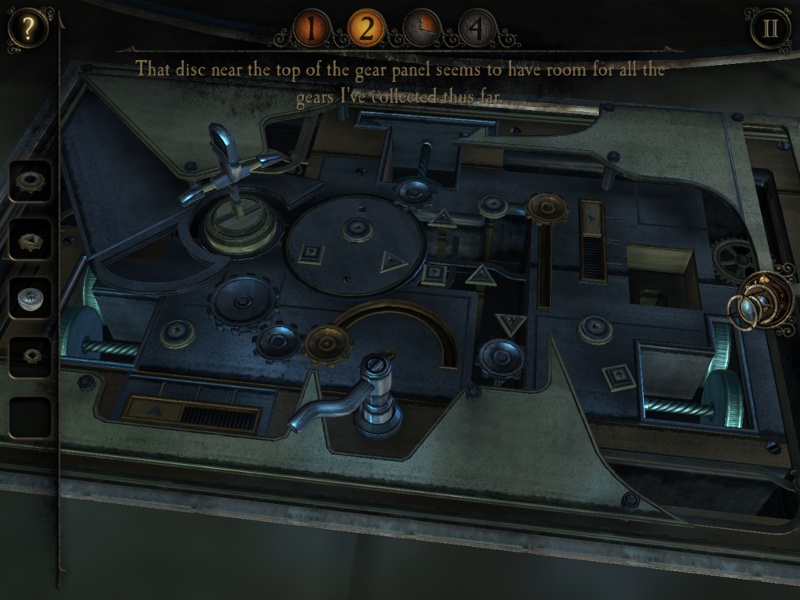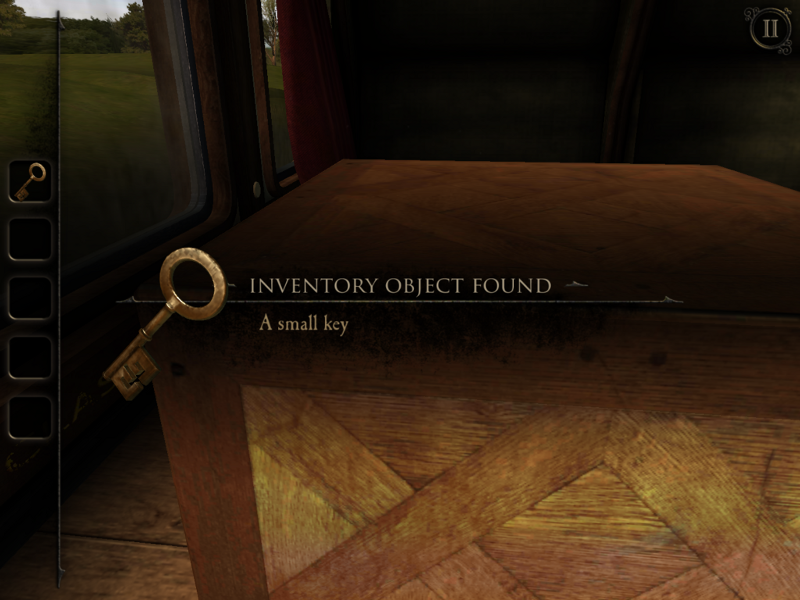The Room 3 | reviews, news & interviews
The Room 3
The Room 3
A tactile puzzle of ingenious construction

The Room 3 is the latest in Fireproof Games' series of tactile puzzle games that invite you to twist, prod and rotate on-screen objects to reveal hidden secrets and activate devious mechanisms. It presents you with intriguing objects and devices that have concealed switches, hidden panels and features that you must find and manipulate in order to progress. Think a Fabergé egg, but with a superhuman level of detail and cunning in its construction.
A typical room (don't let the title fool you, there are several) might contain an antique radio that must be tuned in a certain way, using a tool you must find hidden behind the face of a clock, which only opens when the hands point to midnight, but only when you aim a beam of light on a crystal on its pendulum... and so on.
In the previous games, you had begun to uncover a mystery of potentially cosmic proportions with the tricksy little puzzle boxes giving way to devices that can influence the nature of reality itself. The Room 3 continues the story but with a greatly expanded play area comprising several locations, each with sub-rooms and hidden places to explore. For the first time in the series, completing a puzzle might require you to perform actions in several locations, leading to a small amount of backtracking that can be annoying, but which is thankfully not overdone.
 The plot is really just a way of explaining why someone went to the trouble of creating such bizarre puzzles but your new antagonist, "The Craftsman", is a nice addition to the game and adds a sinister note to proceedings. As you move around the game you will find scrolls with scribbled messages from The Craftsman, some of which encourage you to keep exploring while others hint that doing so might not be in your best interests.
The plot is really just a way of explaining why someone went to the trouble of creating such bizarre puzzles but your new antagonist, "The Craftsman", is a nice addition to the game and adds a sinister note to proceedings. As you move around the game you will find scrolls with scribbled messages from The Craftsman, some of which encourage you to keep exploring while others hint that doing so might not be in your best interests.
The puzzles are as tough but logical as ever and the hint system is very well calibrated to give you just the help you need but no more. The game engine is very well thought-out and objects almost always behave as you would expect when touched. There is something very satisfying about turning a key in a lock with the twist of a fingertip or realising that you can use two fingers to slide switches on opposite ends of a table simultaneously.
If there's one complaint, it is that the eyepiece, which in earlier games was used to reveal hidden messages or invisible mechanisms, now works more like a sort of teleporter and makes some puzzles feel more contrived and less "real" than the classic mechanical puzzles of the original. One of the real joys of the first game was in discovering just how much could be packed into a small cabinet, or how well a keyhole might be hidden in plain sight. The puzzles here seem slightly less intricate in some instances, and you are often pushed on to the next area after solving just a few of them rather than mulling over the same object for hours on end.
Puzzling your way to the final Room can be done in a few hours if you stick at it but there are several alternative endings to be discovered which require you to find hidden artefacts and place them just so. These endings don't have any hints so you will need to use all your powers of lateral thinking if you are to find them all.
- The Room 3 is out now for Android and iOS. Published by Fireproof Games
- Read other gaming reviews on theartsdesk
The future of Arts Journalism
You can stop theartsdesk.com closing!
We urgently need financing to survive. Our fundraising drive has thus far raised £49,000 but we need to reach £100,000 or we will be forced to close. Please contribute here: https://gofund.me/c3f6033d
And if you can forward this information to anyone who might assist, we’d be grateful.

Subscribe to theartsdesk.com
Thank you for continuing to read our work on theartsdesk.com. For unlimited access to every article in its entirety, including our archive of more than 15,000 pieces, we're asking for £5 per month or £40 per year. We feel it's a very good deal, and hope you do too.
To take a subscription now simply click here.
And if you're looking for that extra gift for a friend or family member, why not treat them to a theartsdesk.com gift subscription?
more Gaming
 'We are bowled over!' Thank you for your messages of love and support
Much-appreciated words of commendation from readers and the cultural community
'We are bowled over!' Thank you for your messages of love and support
Much-appreciated words of commendation from readers and the cultural community
 Kelly Clancy: Playing with Reality - How Games Shape Our World review - how far games go back
The acclaimed neuroscientist on the world and history of games, in all their variety
Kelly Clancy: Playing with Reality - How Games Shape Our World review - how far games go back
The acclaimed neuroscientist on the world and history of games, in all their variety
 Rage 2 review – garish but great post-apocalyptic shooter
Challenge The Authority in this 'Mad Max on mushrooms' renegade romp
Rage 2 review – garish but great post-apocalyptic shooter
Challenge The Authority in this 'Mad Max on mushrooms' renegade romp
 World War Z review - bloodthirsty fun with the zombie apocalypse
Chainsawing the brain-eaters as you battle against the tide of the undead
World War Z review - bloodthirsty fun with the zombie apocalypse
Chainsawing the brain-eaters as you battle against the tide of the undead
 The Lego Movie 2 Videogame review - everything is not awesome
Few fresh ideas means this movie adaptation treads the same old ground
The Lego Movie 2 Videogame review - everything is not awesome
Few fresh ideas means this movie adaptation treads the same old ground
 Anthem review - singing praises? More like a cautious nod
A rocky start for a new franchise that offers potential and problems in equal measure
Anthem review - singing praises? More like a cautious nod
A rocky start for a new franchise that offers potential and problems in equal measure
 Crackdown 3 review - spectacular super-powered action that was great fun many years ago
Nearly a decade has passed since the last incarnation but little has changed in this stagnant shooter
Crackdown 3 review - spectacular super-powered action that was great fun many years ago
Nearly a decade has passed since the last incarnation but little has changed in this stagnant shooter
 Battlefield V review - WWII on an epic scale
The veteran series returns for another ambitious tour of duty
Battlefield V review - WWII on an epic scale
The veteran series returns for another ambitious tour of duty
 Fallout 76 review - how to wreck a perfectly good legacy with one messy game
When home runs go horribly wrong
Fallout 76 review - how to wreck a perfectly good legacy with one messy game
When home runs go horribly wrong
 Red Dead Redemption 2 review - the cowboy drama makes a triumphant return
An ambitious Wild West odyssey that matches epic scale with benchmark skill
Red Dead Redemption 2 review - the cowboy drama makes a triumphant return
An ambitious Wild West odyssey that matches epic scale with benchmark skill
 Call of Duty: Black Ops 4 review – less is more
Solo rations have been relegated from this benchmark war series
Call of Duty: Black Ops 4 review – less is more
Solo rations have been relegated from this benchmark war series
 FIFA 19 review - the best just got a bit better
It looks and plays great, but what’s new?
FIFA 19 review - the best just got a bit better
It looks and plays great, but what’s new?

Add comment